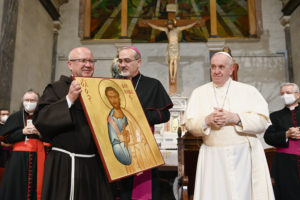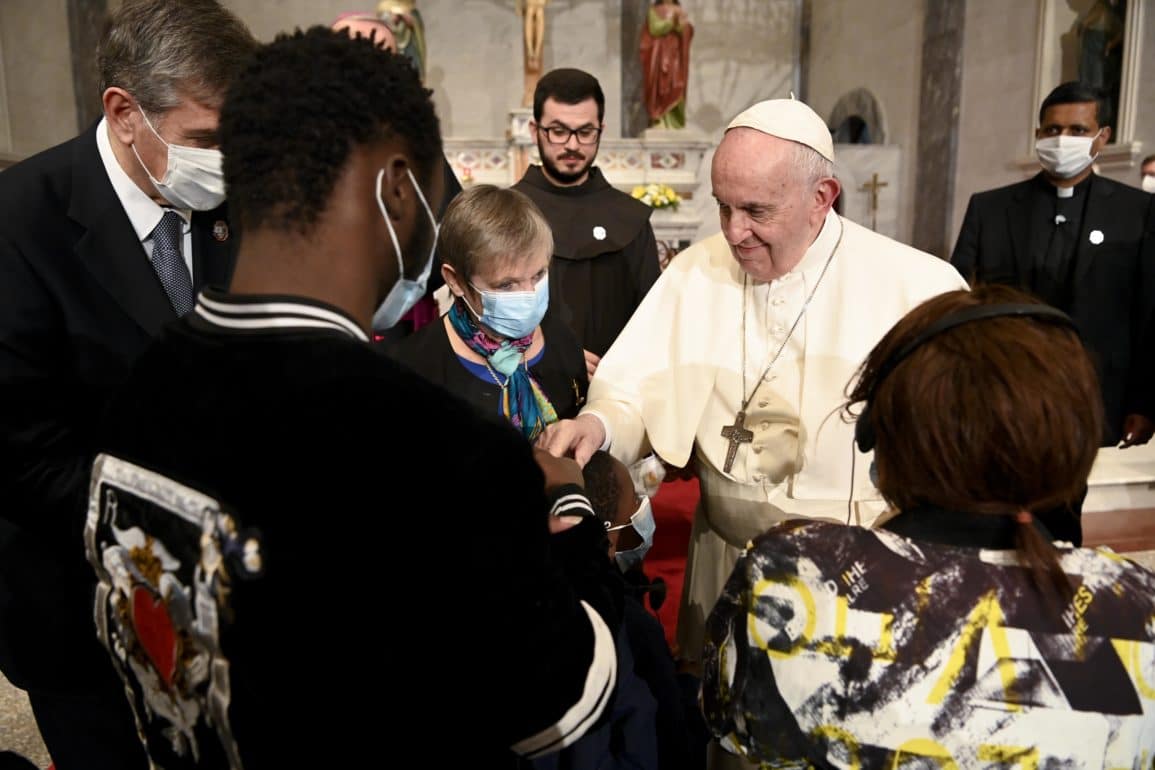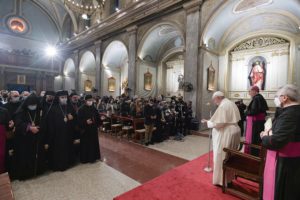“You are no longer strangers, but fellow citizens.”
These were the words of encouragement of Pope Francis today when he led an ecumenical prayer service with migrants at the Parish Church of the Holy Cross in Nicosia. It was the Holy Father’s last big event in Cyprus and included testimonies from four young migrants of different backgrounds and a member of the board of Caritas Cyprus.
“This is the prophecy of the Church: a community that, for all its human limitations, incarnates God’s dream,” the Pope said. “For God too dreams, like you, Mariamie, from the Democratic Republic of the Congo, who described yourself as ‘full of dreams’. Like yourself, God dreams of a world of peace, in which all his children live as brothers and sisters.”
The Pope told the crowd that he had received the written testimonies of the young migrants a month in advance of the event — and had been moved by their words. He admitted he was moved again today upon hearing the words spoken. (See testimonies following Holy Father’s remarks below.)
“Your presence, migrant brothers and sisters, is very significant for this celebration,” Francis stressed. “Your testimonies are like a ‘mirror’ held up to us, to our Christian communities… May this island, marked by a painful division, become by God’s grace a workshop of fraternity. So it will, if two things can happen.”
 Following is the Address of the Holy Father, provided by the Vatican:
Following is the Address of the Holy Father, provided by the Vatican:
Dear Brothers and Sisters,
It is a great joy to be here with you and to conclude my visit to Cyprus with this prayer meeting. I thank Patriarchs Pizzaballa and Béchara Raï, and Ms. Elisabeth of Caritas. I greet with affection and gratitude the representatives of the different Christian confessions present in Cyprus.
I want to say, from my heart, a big “thanks” to you, the young migrants who offered your testimonies. I received copies of them in advance, about a month ago. They made a great impression on me then, and again today. More than just moved, I had the powerful sensation that comes from encountering the beauty of truth. Jesus was moved in that way when he cried out: “I thank you, Father, Lord of heaven and earth, because you have hidden these things from the wise and the intelligent and have revealed them to infants” (Mt 11:25). I too give praise to the heavenly Father because this is happening today, here, and throughout the world. God is revealing his Kingdom, his Kingdom of love, justice, and peace, to the little ones.
After listening to you, we better understand all the prophetic power of the word of God, who, through the apostle Paul, tells us: “You are no longer strangers and aliens, but you are fellow citizens with the saints and also members of the household of God” (Eph 2:19). Those words were addressed to the Christians of Ephesus, not far from here, centuries ago, yet they remain as timely as ever, as if they were written for us today: “You are no longer strangers, but fellow citizens”. This is the prophecy of the Church: a community that, for all its human limitations, incarnates God’s dream. For God too dreams, like you, Mariamie, from the Democratic Republic of the Congo, who described yourself as “full of dreams”. Like yourself, God dreams of a world of peace, in which all his children live as brothers and sisters.

When you, Maccolins, who come from Cameroon, tell us that in the course of your life you have been “wounded by hate”, you remind us that hate has also poisoned relationships between us Christians. And this as you said, changes us; it leaves a deep and long-lasting mark. It is a poison hard to remove, a twisted mindset that, instead of letting us see ourselves as brothers and sisters, makes us see one another as enemies, as rivals.
When you, Rozh, who come from Iraq, say that you are someone “on a journey”, you remind us that we ourselves are a community on a journey; we are journeying from conflict to communion. On this road, which is long and has its ups and downs, we should not be afraid of our differences, but of the close-mindedness and prejudice that can prevent us from truly encountering one another and journeying together.
Close-mindedness and prejudice re-erect the wall of division, the hostility between us, that Christ tore down (cf. Eph 2:14). Our journey towards full unity can only advance to the extent that, together, we keep our eyes fixed on Jesus, who is “our peace” (ibid.), the “cornerstone” (v. 20). It is he, the Lord Jesus, whom we encounter in the faces of our marginalized and discarded brothers and sisters. In the face of the migrant who is despised, rejected, put in a cage… But at the same time – as you said – the face of the migrant journeying to a goal, to a hope, to greater human companionship…
In all these ways, God speaks to us through our dreams. He asks us not to be content with a divided world, divided Christian communities, but to journey through history drawn by his own dream: the dream of a humanity freed of walls of division, freed of hostility, where there are no longer strangers, but only fellow citizens. Fellow citizens who are diverse, yet proud of that diversity and individuality, which are God’s gift. Fellow citizens, reconciled and at one.
May this island, marked by a painful division, become by God’s grace a workshop of fraternity. So it will, if two things can happen. First, effective recognition of the dignity of every human person (cf. Fratelli Tutti, 8): this is the ethical foundation, a universal foundation, which is also at the core of Christian social doctrine. Second, a trusting openness to God the Father of all; this is the “leaven” that we, as believers, are called to offer (cf. ibid., 272).
If these two things can happen, the dream can translate into a daily journey, made up of concrete steps from conflict to communion, from hate to love. A patient journey, which day by day leads us to the land God has prepared for us. The land where, if people ask,“Who are you?”, you can readily respond, “I am your brother”. “I am your sister”.
© Libreria Editrice Vatican
Videos: ©️ Papal Flight Press Pool
Migrants’ Intervention
Testimony of 4 young migrants of Different Backgrounds
TESTIMONY 1 (Middle Eastern):
As someone far from my own home, family, village, people, and country, I am often asked who I am. The questions are not meant to wound but they feel like blows. “Who are you?” “Why are you here?” “What is your status?” “Do you expect to stay?” “Where will you go?”
Every day, I have to reduce everything that I may be or hope to be or want to become, into a checkmark next to a box on a form. I have to use a word or two to explain myself to one of the few who might choose to ask or to acknowledge that I am even here. What do I say? Usually, I must choose “XENOS”, “foreigner”, “victim”, “asylum seeker”, “refugee”, “migrant”, “other”, but what I want to scream is “person”, “brother”, “friend”, “believer”, “neighbor”.
Inevitably, I – and all of us – wander around wondering who we are. I am many things.
TESTIMONY 2 (African):
I am someone wounded by hate. Hate, once experienced, cannot be forgotten. It changed me; it changes us. Hate takes many hideous forms. There is the hate that leads one human being to use a gun not just to shoot another but to break his bones while others watch. There is the hate that can overtake someone’s soul enough to violate human life while coldly looking into their eyes, as well as the hate that can be calculating and unfeeling, that leads to planting a land mine, aware it will destroy anyone or anything that unknowingly passes by.
I am hurt not just by the malice that maims, cuts, or kills others, but by the disregard and neglect that sets fires, destroys forests, mines and scars the earth, and pollutes the water that I need to quench my thirst and survive.
I am pained by the hateful acts that make it impossible to learn, work or live on parts of our common
home.
And I am someone pained by the lack of love that makes me feel less than others, unwanted, a
burden; by the subtle hate that robs me of a kind word, a much-needed smile on a cold day; by the barriers that keep me on the margins of the community in which I find myself.
TESTIMONY 3 (South Asian):
I am someone who is on a journey. I have had to run away from violence, bombs, knives, hunger, and pain. I have been forced along dusty roads, pushed into trucks, hidden in the trunks of cars, thrown into leaking boats – deceived, exploited, forgotten, denied. I was forced on my journey.
Yet my journey has also been towards something. I journey every day, anxious to reach a new destination. A place of safety and health, a place that affords liberties and choices, a place where I can give and receive love, a place where I can practice my faith and my customs proudly, sharing them with others, a place where I can dare to hope.
My journey takes me towards the light of faith, knowledge, and human companionship.
TESTIMONY 4 (young woman):
I am someone who is full of dreams. I have big dreams – I dream of a world where no one is forced to fight, do battle, give up, flee or cry (except maybe for joy). A world where no one is ripped from their bed in the dark of night leaving behind favorite toys, abandoning everything to get away. I dream of world peace, of countries not fighting with each other, and of people of the same country not hurting one another, denying each other freedom or human rights.
I dream of beauty – the kind of natural beauty that brings a smile to my face. Children with their parents, families together, flowers blooming, water running, voices raised in song.
Yet I also have small dreams. I close my eyes and dream of the smell of my grandmother’s cooking, the fields after a good rain that will nurture the seeds, the sea breeze.
I dream of being top of my class and of becoming a doctor. And I dream of being welcome everywhere—here in church, in every classroom and shop. I dream of people being interested in me, not suspicious, and of people being less surprised when I speak to them in Greek and I dream of others trying to talk to me in French.
I dream of smiles.
*.*.*
TESTIMONY
So, who am I? Who are you? We are many things.
We are all different, but we are all also part of the same “we” here in Cyprus. “EMEIS EIMASTE EMEIS”.
All of us are vulnerable to hate and in need of love.
All of us are travelers who struggle to move forward faithfully every day in search of light and warmth. All of us are on a journey that is easier together.
None of us wants to be alone.



 Following is the Address of the Holy Father, provided by the Vatican:
Following is the Address of the Holy Father, provided by the Vatican:






